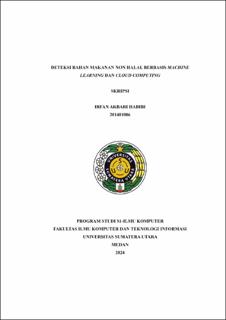Deteksi Bahan Makanan Non Halal Berbasis Machine Learning dan Cloud Computing
Detection of Non-Halal Food Ingredients Based on Machine Learning and Cloud Computing

Date
2024Author
Habibi, Irfan Akbari
Advisor(s)
Hardi, Sri Melvani
Jaya, Ivan
Metadata
Show full item recordAbstract
Indonesia has a significant Muslim population. In Islamic teachings, consuming halal
food is an obligation for Muslims. However, in the current era of globalization, Muslims
need to maintain the halalness of the products they consume, especially people who are
visiting or are in countries that have a majority non-Muslim population. Several
previous studies have successfully created a system or application to detect the halal
status of a packaged food or beverage product. In this research, the author proposes the
development of the technology used, especially for imported food products and can be
used by tourists traveling to countries that have a minority Muslim population. This
system utilizes OCR technology, Machine Learning and Cloud Computing, and the
system is made to support several languages. In this research, the authors implemented
Cloud Computing technology and utilized Long Short-Term Memory (LSTM)
architecture. The model is trained with a pre-processed composition text dataset, then
with 2 LSTM layers, 2 Dropout layers, and 2 Dense layers. The results of the model get
a training accuracy of 99.99% and a training loss of 0.00041 and accuracy using real
food sample test data of 84% with recall and precision of 88.89%, and F1 Score of
88.90%. This model is then deployed to cloud computing services to be implemented
into an android application. It is hoped that this research can provide important benefits
for users in assessing the halal composition of packaged food and beverage products,
especially for Muslims who are abroad.
Collections
- Undergraduate Theses [1254]
